Lawmakers to take anti-bribery pledge

Treasury Cabinet Secretary Henry Rotich reads the 2017/2018 budget speech at Parliament Buildings on March 30, 2017. MPs will be required to make a written commitment not to take bribes. PHOTO | JEFF ANGOTE | NATION MEDIA GROUP
What you need to know:
- In the code of conduct, the lawmakers are required to adhere to seven general principles.
Members of the next Parliament will be required to make a written commitment, after they have been sworn in, not to take bribes or be unduly influenced in the course of their duties.
The leadership of the Houses has already written to those awaiting the swearing-in and induction, informing them about the issue.
It has also sent them the document.
MORALS
National Assembly Clerk Michael Sialai told the Nation that the Ethics and Anti-Corruption Commission (EACC) is also involved in the matter as the institution charged with ensuring that State officers and civil servants behave ethically.
“The EACC has written to us, saying as soon as they are sworn in, they must sign that document.
"We are preparing for that and there will be a period after they are sworn in within which they will sign the document,” Mr Sialai said.
CONDUCT
The EACC had asked Parliament to decide on which code of conduct to be adopted.
There is one in the Public Officers Ethics Act and another provided by the EACC.
Parliament however has its own in the newly enacted Parliamentary Powers and Privileges Act.
In the code of conduct, the lawmakers — in both the National Assembly and the Senate — are required to adhere to seven general principles.
These are: selflessness, integrity, objectivity, accountability, openness, honesty and leadership.
SALARIES
In particular, the code forbids lawmakers from taking money as a reward or an incentive to do their job, being paid for giving advice or services on parliamentary matters or incurring an expense that unduly influences them.
They are also required to register with the speaker all the interests that may influence their jobs, declare interest before making contributions in committees and to observe all rules regarding the money due to them as lawmakers.
Kenyan lawmakers have had a history of increasing their own salaries but that has been taken care of through the establishment of the independent Salaries and Remuneration Commission.
Last month, the commission announced new salary structures for elected leaders and representatives at the national and devolved levels.





